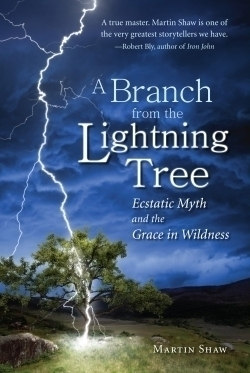A Branch from the Lightning Tree
Ecstatic Myth and the Grace of Wildness
To embark upon a mythic journey one needs a guide. Martin Shaw, who gave up a lucrative music contract to live in a tent in the wild borderlands of Wales for four years and pursue the study of myth, has an excellent resumé for the job. An author, mythologist, storyteller, and wilderness rites-of-passage guide now based in Devonshire, England, Shaw is also an international teacher who tours the United States and Canada and serves as visiting lecturer in Archbishop Desmond Tutu’s Leadership Program at Oxford University. A Branch from the Lightning Tree, Shaw’s latest book, presents seven branches form the Lightning Tree of Initiation in impassioned prose that has the very breath of wildness in it.
Shaw has told stories beside fires, on mountainsides, in forests, in Yurts thrashed by rain, in Brooklyn brownstones, and in lecture halls around the world to corporate leaders, at-risk youth, medicine people, the dying, and seekers of all ages, and says that “No one has ever failed to enter the story or been anything but delighted when they found an element from their own culture.” Even when told poorly, Shaw says that the story has always worked its magic. “In the triadic configuration some surprise waits that the story, teller, or participant could never have anticipated! This surprise—an observation or insight—is all part of the life-preserving aspect of myth.”
These are mythic times, a fairy tale grown large and bold, with real life-or-death consequences. At such times, the words of someone who knows the transformative power of story are food and drink—life—to those who must make the choices that determine their fate. Confront the dragon, or stay safely hidden in the cave? Fight for the princess or settle for the miller’s second daughter? Weave the spells that would free the captives, or hide one’s craft for fear of the powers that be? These times demand that we learn to discern “the myth-language being spoken through the depleted ice cap and fatigued bee,” says Shaw, and in the hungry eyes of our children, and the broken hearts of our elders.
The very meaning of the word “culture” once included the wild—it referred to tilling up the soil, moving downward toward all that is dark, rich, and fecund; now it excludes it—the artist’s passion for bright fields and lowering skies, the lightning bolt through the heart played out in paint is now bought and sold as a commodity. And even though Shaw declares that poetry is “the natural result of any mythic experience,” today’s potential poet may be on medication and contemplating taking a job as an accountant. Shaw’s lament for wildness is a potent reminder that culture has need of it; it demands a return to the imaginative freedom of childhood without, however, becoming “childish;” it needs an inclusiveness that admits vulnerability, confusion, and risk, and is ever attentive to the whispers of the goddesses and gods that impel each creative act with “sacred hallucinations.”
True artists and poets, kitchen alchemists, wild crafters, and devoted seed-savers certainly must already have a visceral awareness of Shaw’s truths, but to find them articulated so well is to see them anew, to hear the urgency of their call, to taste metal and smell the acrid smoke of coming battle.
Yet Shaw, who knows such things well, declares that it is not the battle, not the vision quest with its nights in the forest among wild and hungry beasts, that is the greatest challenge; instead, he says that once one has been irrevocably changed by an encounter with wildness, inner and outer, it is the return to society that is most difficult. While myth may cast seekers as outsiders, it also welcomes them home upon their return from the quest. Western society offers no such thing; those who breathe a sigh of relief when bothersome, restless seekers vanish into the woods won’t suddenly open their arms to receive them when they return wild-eyed, smelling of wood smoke and sweat, and covered in the blood of slain dragons, fearing that they, too, might be called upon to burn the script, leave their mortgaged lives, and embark upon journeys of their own.
Lovers of myth and poetry, and all who yearn for the truths that lie buried in the dark, rich soil of the soul will find a kindred spirit in Shaw, whose “galloping language and green silence” calls forth today’s storytellers—the Soul Teachers who can bring their prophetic energies to join hands with the wild things of Earth and howl songs of freedom to the opening sky.
Reviewed by
Kristine Morris
Disclosure: This article is not an endorsement, but a review. The publisher of this book provided free copies of the book to have their book reviewed by a professional reviewer. No fee was paid by the publisher for this review. Foreword Reviews only recommends books that we love. Foreword Magazine, Inc. is disclosing this in accordance with the Federal Trade Commission’s 16 CFR, Part 255.

